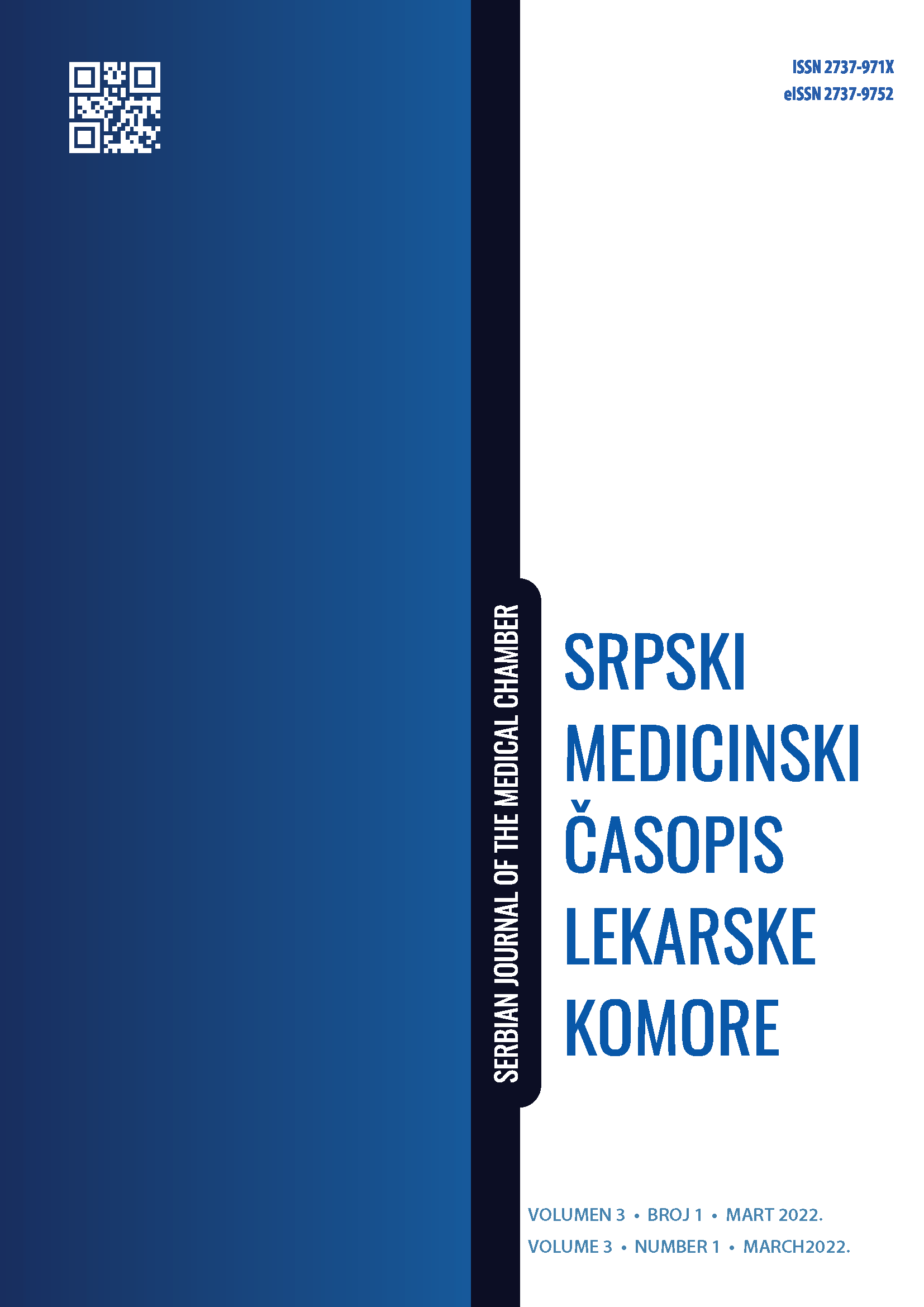FACTORS ASSOCIATED WITH THE SUBJECTIVE FEELING OF FATIGUE THREE MONTHS AFTER COVID-19
Abstract
Introduction: The subjective feeling of fatigue is one of the most common post-COVID-19 manifestations. It is characterized by intolerance to physical and cognitive effort that the individual previously tolerated well, accompanied by weakness and other symptoms.
Aim: The aim of this study was to examine the frequency of the subjective feeling of fatigue, three months after recovery from the infection, amongst patients who had been infected with COVID-19, as well as to analyze correlated factors.
Methods: This cross-sectional study included 110 patients who had previously contracted COVID-19, and who came for a regular follow-up examination at the Health Center Kosovska Mitrovica, 3 months after recovery from acute infection. A specially designed questionnaire was used, which consisted of the segment with sociodemographic data, the segment with the data on the patient’s health status and the course of their COVID-19 infection, as well as the segment of the questionnaire related to self-assessment of the patient’s health status after the COVID-19 infection.
Results: In our sample, out of 110 respondents, as many as 52 felt fatigue. Factors that were statistically significantly associated with the subjective feeling of fatigue, three months after treatment, were the age of the subject and the presence of chronic disease (p < 0.05). The presence of fever and pneumonia during infection were statistically significantly associated with the presence of the subjective feeling of fatigue, three months after treatment (p < 0.05). Hospitalized patients and those who were hospitalized for a longer period of time were also more likely to feel fatigue three months after recovering from the infection (p < 0.05).
Conclusion: The subjective feeling of fatigue, as one of post-COVID manifestations, as well as the consequent inability of the patient to resume work-related and personal tasks and responsibilities, can be a serious individual and public health problem, which is why it is necessary to appropriately recognize and treat it.
References
- Ahn DG, Shin HJ, Kim MH, Lee S, Kim HS, Myoung J, Kim BT, Kim SJ. Current Status of Epidemiology, Diagnosis, Therapeutics, and Vaccines for Novel Coronavirus Disease 2019 (COVID-19). J Microbiol Biotechnol. 2020 Mar 28;30(3):313-324.
- Atzrodt CL, Maknojia I, McCarthy RDP, Oldfield TM, Po J, Ta KTL, Stepp HE, Clements TP. A Guide to COVID-19: a global pandemic caused by the novel coronavirus SARS-CoV-2. FEBS J. 2020 Sep;287(17):3633-3650.
- Gao Z, Xu Y, Sun C, et al. A systematic review of asymptomatic infections with COVID-19. J Microbiol Immunol Infect. 2021;54(1):12-16.
- Wiersinga WJ, Rhodes A, Cheng AC, Peacock SJ, Prescott HC. Pathophysiology, Transmission, Diagnosis, and Treatment of Coronavirus Disease 2019 (COVID-19): A Review. JAMA. 2020 Aug 25;324(8):782-793.
- Attaway A H, Scheraga R G, Bhimraj A, Biehl M, HatipoÄŸlu U. Severe covid-19 pneumonia: pathogenesis and clinical management BMJ 2021; 372 :n436
- Lamprecht B. Gibt es ein Post-COVID-Syndrom? [Is there a post-COVID syndrome?]. Pneumologe (Berl). 2020 Oct 8:1-4. German.
- Maltezou HC, Pavli A, Tsakris A. Post-COVID Syndrome: An Insight on Its Pathogenesis. Vaccines (Basel). 2021 May 12;9(5):497. doi: 10.3390/vaccines9050497. PMID: 34066007; PMCID: PMC8151752.
- Nacul, Luis et al. “European Network on Myalgic Encephalomyelitis/Chronic Fatigue Syndrome (EUROMENE): Expert Consensus on the Diagnosis, Service Provision, and Care of People with ME/CFS in Europe.” Medicina (Kaunas, Lithuania) vol. 57,5 510. 19 May. 202
- Roerink ME, van der Schaaf ME, Dinarello CA, Knoop H, van der Meer JW. Interleukin-1 as a mediator of fatigue in disease: a narrative review. J Neuroinflammation. 2017;14(1):16. Published 2017 Jan 21. doi:10.1186/s12974-017-0796-7
- Russell A, Hepgul N, Nikkheslat N, et al. Persistent fatigue induced by interferon-alpha: a novel, inflammation-based, proxy model of chronic fatigue syndrome. Psychoneuroendocrinology. 2019;100:276-285. doi:10.1016/j.psyneuen.2018.11.032
- "CDC, Chronic Fatigue Syndrome (CFS), Making a Diagnosis" (PDF). Cdc.gov. Archived (PDF) from the original on 2011-10-16.
- Ross SD, Estok RP, Frame D, Stone LR, Ludensky V, Levine CB (May 2004). "Disability and chronic fatigue syndrome: a focus on function". Archives of Internal Medicine. 164 (10): 1098–107.
- Mackay A. A Paradigm for Post-Covid-19 Fatigue Syndrome Analogous to ME/CFS. Front Neurol. 2021 Aug 2;12:701419. doi: 10.3389/fneur.2021.701419. PMID: 34408721;
- Tenforde MW, Kim SS, Lindsell CJ, Rose EB, Shapiro NI, Files DC, et al. Symptom duration and risk factors for delayed return to usual health among outpatients with COVID-19 in a multistate health care systems network — united states, march–june 2020) MMWR. (2020) 69:993–8
- Carfì A, Bernabei R, Landi F. Persistent symptoms in patients after acute COVID-19. JAMA. (2020) 324:603–5.
- Townsend L, Dyer AH, Jones K, Dunne J, Mooney A, Gaffney F, et al. Persistent fatigue following SARS-CoV-2 infection is common and independent of severity of initial infection. PLoS ONE. (2020) 15:e0240784
- Huang C, Huang L, Wang Y, Li X, Ren L et al. 6-month consequences of COVID-19 in patients discharged from hospital: a cohort study. Lancet. 2021 Jan 16;397(10270):220-232.
- Tenforde, Mark W et al. “Symptom Duration and Risk Factors for Delayed Return to Usual Health Among Outpatients with COVID-19 in a Multistate Health Care Systems Network - United States, March-June 2020.” MMWR. Morbidity and mortality weekly report vol. 69,30 993-998. 31 Jul. 2020, doi:10.15585/mmwr.mm6930e1
- Carvalho-Schneider C, Laurent E, Lemaignen A. Follow-up of adults with noncritical COVID-19 two months after symptom onset. Clin Microbiol Infect. 2020
- Stavem K, Ghanima W, Olsen MK, Gilboe HM, Einvik G. Prevalence and determinants of fatigue after COVID-19 in non-hospitalized subjects: a population-based study. 2021.
- Iqbal FM, Lam K, Sounderajah V, Clarke JM, Ashrafian H, Darzi A. Characteristics and predictors of acute and chronic post-COVID syndrome: A systematic review and meta-analysis. EClinicalMedicine. 2021;36:100899.

